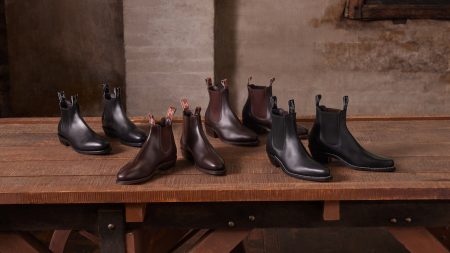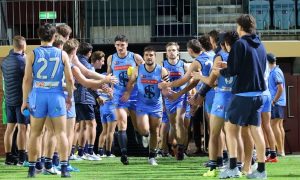Presented by The Gilbert & Sullivan Society of S.A.
Reviewed 26th September, 2019

Who said musicals aren’t about the real world? On the surface, this cheery British story, concocted by two Americans, teaches a simple economic truth – if your customers don’t want what you’re making, stop making it and, instead, make a product they actually want. The show’s underlying philosophy, however, is all about acceptance, inclusion, and being yourself without apology. Harvey Fierstein (actor and playwright) wrote the book of the musical, and Cyndi Lauper (singer, songwriter, actor) wrote music and lyrics. Both Fierstein and Lauper are respected equality activists, but there is no heavy-handed preaching in this merry romp. It’s all about men and their dads, masculinity, drag, fun and fetish footwear.
When his father dies unexpectedly, feckless young Charlie Price inherits the family shoe factory in Northampton in England’s east Midlands. Although he was brought up on a steady diet of boot and shoe manufacture, Charlie never considered taking over the factory. Although Charlie and his ambitious fiancée Nicola have shifted to London, he goes back to Northampton to try and salvage his dad’s old-fashioned shoe factory. Business is on the skids because nobody wants to buy their conventional, craftsman-made gentlemen’s shoes.

There are two pivotal roles in this show; Charlie Price, whose journey from aimless twit to fearless factory champion and shoe innovator forms the arc of the story, and Lola (aka Simon), trained pugilist, mouthy drag queen and style icon. Without these twin pillars the structure of the show fails. Ian Andrew inhabited the life of Charlie Price. His acting was excellent, bringing complex levels of insecurity, bluster, sensitivity and warmth to the role, consistently enabling the energy levels of the show to remain reasonably high. His singing voice was in fine shape, showing a bright rock tenor edge in I Come To The Rescue and performing the rock-bottom desolate Soul Of A Man with despair but no self-pity. Andrew’s spoken voice was clear and consistent throughout the show, and he shared both space and focus generously with his fellow-actors.
The other vital role, Lola/Simon, needs a man with inner integrity and extraordinary emotional energy. For Lola/Simon, “camp” is a valid expression of personality; it should be as natural to him as breathing. Ron Abelita faced the multiple challenges of this role with great bravery and unstinting energy. However, he lacked sufficient acting and vocal resources to bring Lola/Simon’s complex character to the stage. The upper range of Abelita’s singing voice, challenged by the range of the role, frequently tightened and flattened. Because he seemed unsure whether to play Lola as an archetype for quick gay-gag laughs or as a genuine person with camp style, Abelita often fell short of the authority and terrifying gravitas of a drag queen in full tantrum mode. What should have been his 10 o’clock triumph, Hold Me In Your Heart, demanded a stronger core of acting and vocal strength. His quieter moments were more successful, particularly in his thoughtful duet with Andrew, I’m Not My Father’s Son.
Outstanding among the supporting roles was Jemma McCulloch, whose Lauren was giggly, playful, direct, sincere and warm. She acted, sang and moved with clear conviction and great skill. McCulloch’s excellent singing of the anthemic History Of Wrong Guys was a highlight of the show. Ruby Pinkerton played Charlie’s go-getter girlfriend, Nicola, with lovely style, although her spoken dialogue was often too rapid and consequently indistinct. Warren Logan is growing into his role; he displayed enough intelligent understanding of Don’s character to make it both interesting and engaging. I suspect he will develop even more character complexity by the end of the run. Trish, as played by Vanessa Lee Shirley, is your salt-of-the-earth woman, and Shirley ensured that everything she did was effective, economic and accurate. Sharp and lively Dharini Rajaramanan may have thought that her tiny role was inconsequential. However, she shone constantly, with focussed work in acting, movement and voice. Shop foreman George, in his grey dustcoat and specs, is just the right territory for James McCluskey-Garcia. It’s evident that he simply loves getting his teeth into a character.
The creative work of Ann Humphries, as Costume Designer, played a huge role in the success of this show. From factory workers’ clothes to smart city wear to rhapsodically sequinned drag, her designs were crammed with creative details and exuberant flourishes. She (and Costume Assistants Helen Snoswell and Louise Watkins) deserve special applause.
Choral work varied from good to excellent; a clear product of Paul Sinkinson’s work as Musical Director. On occasion, the sound system failed to handle the sonic breadth of the company’s vocal tone, but that’s a compliment for the vocal skill of the company. (And a note for the sound operator.) Sinkinson also drives the eleven-piece band from his keyboard, ably assisted by his Associate Musical Director Peter Johns. Sinkinson’s tempi are spot-on and the band has the appropriate rock-pop feel for Lauper’s score. Equalisation kept getting better during performance, so I predict a season of exuberantly well-played music.

What Sarah Williams brings to this piece as its Choreographer is a remarkably subtle understanding of style. She gives dance moves to phlegmatic Midlands factory workers and drag queens and manages to make all the movement sit within the integrity of the show’s plot without making anyone look silly or banal. Her work with the Angels is especially praiseworthy. This group of five hard-working men dance in a dizzying number of costumes, balancing on equally dizzying platform stilettos. Williams’ cunning choreography enhances their energetic work.
Praise to the Director, Gordon Combes, for the splendid set design. The front panel flies out, a side flat extends into the stage, a large multi-purpose truck serves for both Angel Club and the shoe factory. It’s natty and ingenious.
At the head of all these moving parts, co-ordinating an extraordinarily entertaining, crowd-pleasing and warm-hearted show, was Director Gordon Combes. His wise and genial hand is everywhere. His directorial choices cleverly heighten the quality of the resources at his command, and reveal his belief in embracing difference at every level – the primary tenet of this show. Well done, Mr Combes, and company.
Reviewed by Pat. H. Wilson
Venue: Arts Theatre, Adelaide
Season: 26th September – 5th October, 2019
Duration: 2.5 hrs
Tickets: $35 – $40
Bookings: www.gandssa.com.au or phone 8447 7239




















